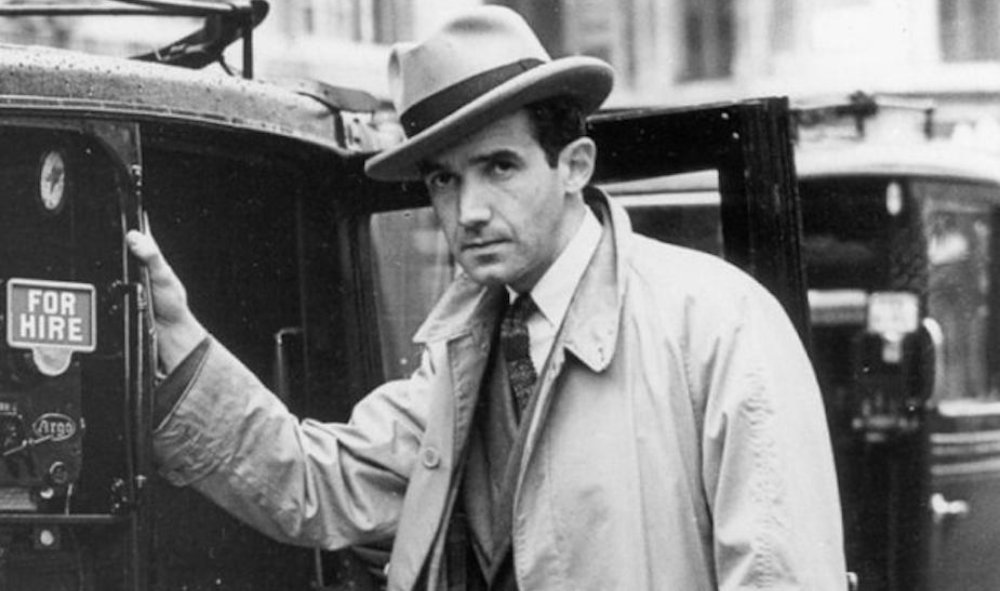No signs can be found, no building or street bears his name, but if you pass through Edison or Blanchard, Washington off Chuckanut Drive you are near the boyhood home of a famous American journalist: Edward R. Murrow.
Today’s news sources occasionally raise Murrow’s name as a symbol of what news reporting can be at its best. This topic sometimes also raises the question of whether current news sources are more show biz than substance. Murrow and “his boys,” as they were called, set ethical, hard-work journalistic standards in their time.
Egbert Roscoe Murrow was born in North Carolina. His family moved to the state of Washington in 1913 when he was five. The tiny Skagit County coastal town of Blanchard, just off scenic, meandering Chuckanut Drive was where the Murrow family eked out a living on the fringes of a wood-products economy. Tall, loud-voiced Egbert, the youngest of three brothers, began using the name “Edward” at Edison High School. Murrow’s memories of summer lumber-jacking in the woods around Puget Sound and the Olympic Peninsula became a life-long, idealistic standard by which he judged himself and others.
Murrow graduated from Washington State College at Pullman, a small town on the Idaho border. Ida Lou Anderson, a physically crippled speech and broadcasting instructor just a few years older than Murrow, became one of his youthful influences. The School of Communications at Washington State (now University) is today named after its most famous graduate.
After graduation, Murrow moved into the neophyte electronic news business largely through his friendship with William S. Paley, founder and then president of the Columbia Broadcast System. The 1930s European political, military and social upheaval found Murrow on the spot, along with William L. Shirer, Robert Trout, Eric Severeid, and others, describing the rise of Benito Mussolini and Adolf Hitler. Murrow’s London broadcasts to the “outside” world during the blitz gained him international recognition and fame. His sonorous opening phrase, “This . . . is London,” became a radio feature. Murrow always credited teacher Ida Lou Anderson for the dramatic pause in his trademark opening words.
News was just that, Murrow believed. He reported the facts economically, with clarity and dramatic timing. His strong sense of fairness and humanity occasionally got in the way of total objectivity. His listeners – and bosses at CBS – usually knew where Murrow stood on a particular story. And where he stood may have had roots in the poverty and hard work of his Washington state youth. Ed Murrow had little time for bullies or pomposity. There was merit, he believed, in the aspirations of minorities, working people, and small defenseless nations.
Despite his fame as a radio and TV newscaster, and the popularity of record albums produced by himself and Fred W. Friendly called “Hear it Now,” and “See it Now,” it was the stormy Senator Joe McCarthy era that may have brought Murrow’s career to its greatest heights. He saw McCarthy’s ham-handed tactics as the greatest threat to his profession and the foundations of a democratic society in his lifetime. Murrow saw to it that McCarthy supporters, including the FBI, came a cropper. His two most famous TV specials were about “McCarthyism” and “Harvest of Shame,” focusing on the issue of world famine.
The handsome, immaculately tailored Murrow, cigarette in hand, fought lung cancer, the waning ripples of McCarthyism, and a Byzantine corporate world at CBS in his last years. He died on April 30, 1965, while a member of President John F. Kennedy’s cabinet – Director of the United States Information Agency.

We could use a guy like him today!
He would be universally ignored.
Upon reading this piece, and its companion on the demise of the editorial cartoonist, the words “the medium is the message” popped into my head. Those words became a catchphrase among members of m-m-m-my generation, part of the chorus of hoots against anything “Establishment”, and in retrospect, they can be interpreted as the first peep over the horizon of the Grim Reaper coming to harvest the myth of objective journalism.
The memory sent me to review Marshall McLuhan’s “Understanding Media”, published the year before Murrow’s death, and its more chilling followup, Neil Postman’s “Amusing Ourselves To Death”, from 1985. For this audience, I trust I need write no more.
For the little it’s worth, I once considered a career in the media, dabbling in it as an undergraduate and during graduate school. I rejected the option when it became clear that the purpose of the media was to make money, period, and making that money would require the suppression of inconvenient fact. Being, alas, addicted to fact, I stuck with the sciences, despite, in this line of work as well, the struggle between fact and profit and its depressing impact on personal and financial well-being.
I have come to view Murrow’s time on the stage as one of the few times in world history in which the presentation of objective fact, or what could be made to appear as objective fact, was what made money. The legacy media outlets from that time, that still exist, pander desperately to stay solvent, while Mr Zuckerberg, last I looked, owns a sizable chunk of the Hawaiian island of Kauai. Our angst over what was strikes me as slamming the barn door shut long, long after the horse has bolted.
There are so many different news sources now. Most people don’t seem to pay that much attention to network news. We tend to watch news coverage that confirms our biases.
Keith Jackson
First rate informative piece. Many thanks.
Another great broadcast journalist with Washington roots would be Edward P Morgan. Who hailed from Walla Walla.
Chet Huntley, David Brinkley’s other half, attended the Cornish School before graduating from the University of Washington in 1934.